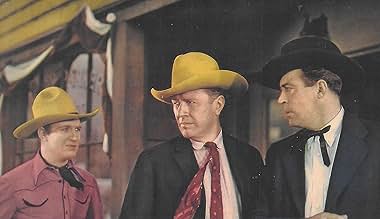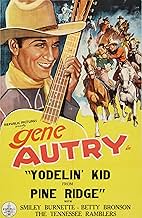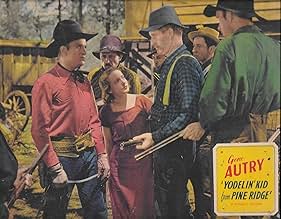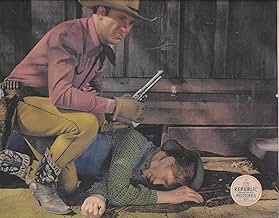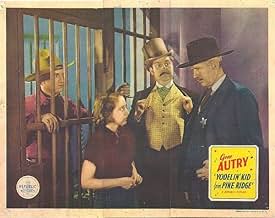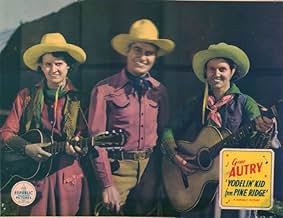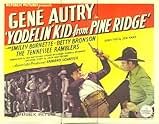Ajouter une intrigue dans votre langueThe old west range war story transported to Georgia, with Autry as the hero.The old west range war story transported to Georgia, with Autry as the hero.The old west range war story transported to Georgia, with Autry as the hero.
- Réalisation
- Scénario
- Casting principal
LeRoy Mason
- Len Parker
- (as Le Roy Mason)
The Tennessee Ramblers
- Comic Musicians
- (as Tennessee Ramblers)
Fred 'Snowflake' Toones
- Sam
- (as Snowflake)
Chris Allen
- Rodeo Spectator
- (non crédité)
W.J. Blair
- Member, The Tennessee Ramblers
- (non crédité)
Charles Brinley
- Cattleman
- (non crédité)
Buck Bucko
- Cowhand
- (non crédité)
Avis à la une
The film begins around the Georgia/Florida border. Ranchers and the 'Turpentines' (local hill people) are at odds with each other. In the middle is Gene Autry—who tries to get both sides to see reason and avoid an all out war. Unfortunately, he ends up ticking off both sides and Gene's father disowns him. As for Gene, he lands on his feet—becoming a rodeo champ and singing sensation. When he returns home after a few years, things have NOT improved but have become a lot worse. So, it's up to our star to find out who's behind the fight—who is stirring up BOTH sides as well as why.
The idea of setting a Gene Autry movie in the Georgia/Florida region was very good—a nice change of pace. After all, back in the 1930s (and even today) northern Florida is home to many ranches and horses are very common there. However, and this is a BIG however, the film looked exactly like any other Gene Autry film—with cowboys, dusty trails and even a canyon—yet there are no canyons in Florida or Georgia and they are also not dusty/desert locales. In fact, they have TONS of rain, foliage, palm trees and the like—none of which you see in "Yodelin' Kid from Pine Ridge"! It's obviously just another California back lot production and the filmmakers took no efforts to even try to make it look like the film was set in the East. To me, this was incredibly lazy and brings up a major problem with many B-westerns—they were produced so quickly that shabby mistakes are too common.
Another problem in the film is the singing. While Autry always had a very nice voice, one of the other singing groups (the ladies who sing at about 34 minutes into the film) are just terrible—and I found myself speeding past their performance. Autry's yodeling, while unpleasant, was at least quite skilled.
All in all, a very disappointing film with little to recommend it. After all, who wants to see a 'western' set in the East Coast where none of this clearly took place?!
The idea of setting a Gene Autry movie in the Georgia/Florida region was very good—a nice change of pace. After all, back in the 1930s (and even today) northern Florida is home to many ranches and horses are very common there. However, and this is a BIG however, the film looked exactly like any other Gene Autry film—with cowboys, dusty trails and even a canyon—yet there are no canyons in Florida or Georgia and they are also not dusty/desert locales. In fact, they have TONS of rain, foliage, palm trees and the like—none of which you see in "Yodelin' Kid from Pine Ridge"! It's obviously just another California back lot production and the filmmakers took no efforts to even try to make it look like the film was set in the East. To me, this was incredibly lazy and brings up a major problem with many B-westerns—they were produced so quickly that shabby mistakes are too common.
Another problem in the film is the singing. While Autry always had a very nice voice, one of the other singing groups (the ladies who sing at about 34 minutes into the film) are just terrible—and I found myself speeding past their performance. Autry's yodeling, while unpleasant, was at least quite skilled.
All in all, a very disappointing film with little to recommend it. After all, who wants to see a 'western' set in the East Coast where none of this clearly took place?!
One reviewer on here said he "couldn't find a single yodel" in "Yodelin' Kid from Pine Ridge". He must have gone to the popcorn stand, or the restroom, just as the movie started, as Gene yodels the first few bars of the theme song over the credits of the movie. Yes, he did yodel, in a number of his early recordings. And yes, so did Roy Rogers. But my opinion is that Gene's yodeling was superior to Rogers'.
Gene Autry started making records in the late 1920s, and many of his early records were his versions of records made earlier by Jimmy Rodgers, who was famous for his yodeling. That's where Gene learned how to yodel.
Gene Autry started making records in the late 1920s, and many of his early records were his versions of records made earlier by Jimmy Rodgers, who was famous for his yodeling. That's where Gene learned how to yodel.
Although in the film Gene Autry is from the town of Pine Ridge and gets to sing quite a few numbers, I don't believe I heard a single yodel come from him in the Yodelin' Kid From Pine Ridge. He was not a yodeler, unlike his main singing cowboy rival who would soon be making his first starring western Roy Rogers. Now he yodeled in just about every film he made.
In Yodelin' Kid From Pine Ridge, Gene is cast as Gene Autry Jr., a sensitive young man who is devoted to the cattle business, but does not like to see the violence developing between the cattlemen and a group of turpentiners who are from the hills. These transplanted hillbillies headed by Russell Simpson like the pine forests because they strip the bark off the pine trees and make turpentine to sell.
The cattlemen however want more grass acreage for the cattle to graze and want to burn down the forest. And they don't like the hillbillies just taking cattle whenever they need a meal. Cattlemen LeRoy Mason and Charles Middleton want to lead the effort to burn the forest. And Middleton is Gene Autry, Sr. Talk about exotic casting, Gene Autry as the son of Ming The Merciless.
Anyway Gene is banished from the councils of the cattlemen and joins a Wild West show and many years go by before he returns to Pine Ridge and only as part of the Wild West show. But he's back involved as soon as he returns. Part of the reason of his involvement is Russell Simpson's stepdaughter, former silent screen star Betty Bronson.
In the 54 minute running time a lot of singing and riding gets mixed in with a lot of gunplay as Gene finally gets to the bottom of the feud between the cattlemen and turpentiners. Not much suspense as it is revealed pretty early in the film, but I won't reveal it.
Smiley Burnette plays the head of the Wild West Show, not the usual sidekick part with Gene. He's still getting a lot of laughs, but you will not hear one frog croak which was part of his screen persona.
For fans of the great singing cowboy tycoon, Yodelin' Kid From Pine Ridge should please them.
In Yodelin' Kid From Pine Ridge, Gene is cast as Gene Autry Jr., a sensitive young man who is devoted to the cattle business, but does not like to see the violence developing between the cattlemen and a group of turpentiners who are from the hills. These transplanted hillbillies headed by Russell Simpson like the pine forests because they strip the bark off the pine trees and make turpentine to sell.
The cattlemen however want more grass acreage for the cattle to graze and want to burn down the forest. And they don't like the hillbillies just taking cattle whenever they need a meal. Cattlemen LeRoy Mason and Charles Middleton want to lead the effort to burn the forest. And Middleton is Gene Autry, Sr. Talk about exotic casting, Gene Autry as the son of Ming The Merciless.
Anyway Gene is banished from the councils of the cattlemen and joins a Wild West show and many years go by before he returns to Pine Ridge and only as part of the Wild West show. But he's back involved as soon as he returns. Part of the reason of his involvement is Russell Simpson's stepdaughter, former silent screen star Betty Bronson.
In the 54 minute running time a lot of singing and riding gets mixed in with a lot of gunplay as Gene finally gets to the bottom of the feud between the cattlemen and turpentiners. Not much suspense as it is revealed pretty early in the film, but I won't reveal it.
Smiley Burnette plays the head of the Wild West Show, not the usual sidekick part with Gene. He's still getting a lot of laughs, but you will not hear one frog croak which was part of his screen persona.
For fans of the great singing cowboy tycoon, Yodelin' Kid From Pine Ridge should please them.
This entry is on everyone's must-see list because it co-stars the legendary Betty Bronson. Betty had actually retired from movie-making in 1932, and after this "comeback", she didn't make another movie until A Pocketful of Miracles in 1961. Betty is absolutely lovely here and it's a thrill to see what a fine pair Gene and Betty make in this really top-notch script that helps to make it (as far as I'm concerned) one of Gene's top five pictures. Other assets include a fine support cast led by Smiley Burnette (who excels in what amounts to a character role), LeRoy Mason (a well-spoken heavy), Charles Middleton (Gene's dull-witted dad), and Russell Simpson (a delight as a really nasty piece of work). Good slots are also provided by Jack Dougherty (the heavy's partner in crime), Henry Hall (the sheriff), Jack Ingram and even Art Mix. Mr Toones, on the other hand, has – thankfully! – but one brief moment.
Despite its somewhat off-putting title, this entry shapes up as one of Gene's most vibrant and exciting. Even Joseph Kane, normally a rather humdrum director, seems to have realized the movie's potential and pulled out all stops to make it as thrilling as possible. Production values are great. (If you're quick, you can plainly spot Kane in a rare on screen appearance as one of the turpentiners. As far as I know he actually faced the camera only five times in his lengthy directorial and editing career).
Please note that while the Platinum Disc print is of good quality, it's mastered from the TV cut-down that's missing six minutes of essential footage, including the opening scenes of the street parade, other bits and pieces here and there, and the entire episode where Gene rides away from his home ranch after being dismissed by his dad, encounters Betty who asks him when he's coming back. Gene tells her that he doesn't know. A tearful Betty promises to wait for his return.
Despite its somewhat off-putting title, this entry shapes up as one of Gene's most vibrant and exciting. Even Joseph Kane, normally a rather humdrum director, seems to have realized the movie's potential and pulled out all stops to make it as thrilling as possible. Production values are great. (If you're quick, you can plainly spot Kane in a rare on screen appearance as one of the turpentiners. As far as I know he actually faced the camera only five times in his lengthy directorial and editing career).
Please note that while the Platinum Disc print is of good quality, it's mastered from the TV cut-down that's missing six minutes of essential footage, including the opening scenes of the street parade, other bits and pieces here and there, and the entire episode where Gene rides away from his home ranch after being dismissed by his dad, encounters Betty who asks him when he's coming back. Gene tells her that he doesn't know. A tearful Betty promises to wait for his return.
In Georgia or the Florida Panhandle, the ranchers think the turpentiners are stealing their cattle. Only Gene Autry knows better, and is kicked out by his father, Charles Middleton. The turpentiners hate him too, despite Betty Bronson speaking up for him. Her father, Russell Simpson is mad at her. Autry gets a job with Smiley Burnette's Wild West congress and investigates.
It's a nice B western for Autry, with the Tennessee Ramblers providing a far more hillbilly sound than usual for the series. With good performers, a script that offers a handsome variation on a stock western plot, and Joseph Kane directing, there's good music and handsome camerawork by William Nobles proceeding at a good pace thanks to editing by Lester Orleback.
Betty Bronson rose to fame when she was chosen to play the title role in the silent version of Peter Pan. She was a fine actress, but tastes changed, her producers didn't know what to do with her, and she largely abandoned the screen after her marriage in 1933. This would be her last screen appearance for two dozen years. She died in 1971, largely forgotten, at the age of 64.
It's a nice B western for Autry, with the Tennessee Ramblers providing a far more hillbilly sound than usual for the series. With good performers, a script that offers a handsome variation on a stock western plot, and Joseph Kane directing, there's good music and handsome camerawork by William Nobles proceeding at a good pace thanks to editing by Lester Orleback.
Betty Bronson rose to fame when she was chosen to play the title role in the silent version of Peter Pan. She was a fine actress, but tastes changed, her producers didn't know what to do with her, and she largely abandoned the screen after her marriage in 1933. This would be her last screen appearance for two dozen years. She died in 1971, largely forgotten, at the age of 64.
Le saviez-vous
- Citations
Col. Millhouse: Marvelous, Autry, marvelous! You certainly have that animal trained and I don't see how you do it. What's the secret?
Gene Autry: The secret in training a horse, Colonel, is that, ah, you have to know more than the horse!
- ConnexionsEdited from La gloire du cirque (1935)
Meilleurs choix
Connectez-vous pour évaluer et suivre la liste de favoris afin de recevoir des recommandations personnalisées
Détails
- Durée1 heure
- Couleur
- Rapport de forme
- 1.37 : 1
Contribuer à cette page
Suggérer une modification ou ajouter du contenu manquant

Lacune principale
By what name was Yodelin' Kid from Pine Ridge (1937) officially released in India in English?
Répondre
